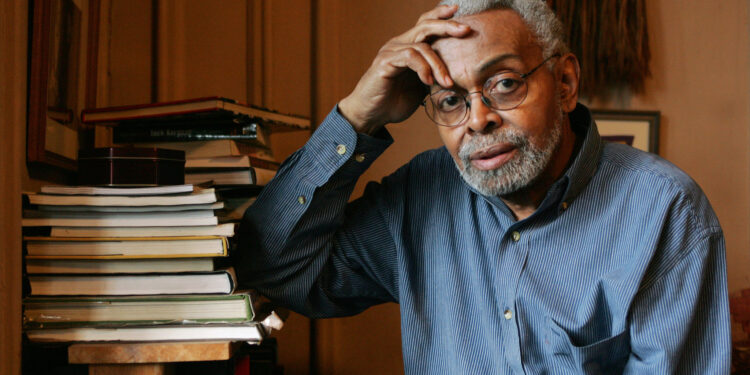Amiri Baraka: Contribution as American Author
Amiri Baraka: Contribution as American Author-What was Amiri Baraka famous for?,What is Amiri Baraka’s most famous poem?,How did Amiri Baraka change the world?,Amiri Baraka, born Everett LeRoi Jones on October 7, 1934, stands as a pivotal figure in American literature, renowned for his multifaceted contributions as a writer, poet, playwright, and activist. Over the course of his extensive career, Baraka played a significant role in shaping the landscape of American literature, particularly within the context of the Black Arts Movement. His profound works addressed crucial issues of race, politics, and culture, challenging prevailing societal norms and advocating for the empowerment of African Americans. This essay delves into Amiri Baraka’s contributions as an American author, highlighting his literary accomplishments, cultural impact, and political activism.Amiri Baraka: Contribution as American Author
Early Life and Influences
Amiri Baraka’s formative years laid the groundwork for his later literary endeavors. Born in Newark, New Jersey, he grew up in a racially segregated America, firsthand witnessing the systemic racism and inequalities of the era. The vibrant cultural scene of Harlem during the 1940s and 1950s, coupled with his exposure to jazz and blues, significantly influenced his artistic sensibilities.Amiri Baraka: Contribution as American Author
Literary Evolution
Baraka’s literary journey commenced in the late 1950s, marked by his foray into poetry and essays. His early works, influenced by the Beat Generation and jazz, reflected a quest for personal expression and freedom. In 1961, his first major poetry collection, “Preface to a Twenty Volume Suicide Note,” marked the emergence of his distinctive voice in American literature.Amiri Baraka: Contribution as American Author
However, the 1960s witnessed a transformative phase for Baraka. Amidst the Civil Rights Movement and the burgeoning Black consciousness, he embraced his African heritage, symbolized by his name change from LeRoi Jones to Amiri Baraka. This shift signified his commitment to racial pride and cultural identity, themes that would become central to his later works.Amiri Baraka: Contribution as American Author
Black Arts Movement
Amiri Baraka played a pivotal role in the Black Arts Movement, a cultural and artistic uprising of the 1960s. This movement sought to establish a distinct African American cultural identity, rejecting assimilation and promoting pride in Black heritage. Baraka’s essay “The Legacy of Malcolm X” (1967) and his play “Dutchman” (1964) are considered seminal works embodying the spirit of the Black Arts Movement.
Also Read-
- Ralph Ellison: Contribution as American Novelist
- Toni Morrison: Contribution as American Novelist
- Alice Walker: Contribution as American Novelis
“The Legacy of Malcolm X” celebrated Malcolm X as a revolutionary figure, urging African Americans to embrace their cultural roots and reject white cultural values. This essay, among others, laid the ideological groundwork for the Black Arts Movement, emphasizing the role of art as a tool for political and cultural liberation.
Poetry and Musical Synergy
Baraka’s poetry is characterized by its rhythmic intensity, vivid imagery, and political engagement. “Black Magic” (1969), a significant collection, exemplifies his commitment to exploring the intersection of art and politics. The poems tackle racial injustice, Black pride, and resistance, showcasing Baraka’s evolving poetic style and his ability to encapsulate the turbulent zeitgeist of the era.Amiri Baraka: Contribution as American Author
Beyond written works, Baraka had a profound connection with music, especially jazz. Collaborating with musicians, his poetry readings were known for their improvisational and musical quality, enhancing the unique nature of Baraka’s artistic expression.Amiri Baraka: Contribution as American Author
Theater and Drama
Baraka’s influence extends beyond poetry into theater and drama. His play “Dutchman,” premiering in 1964, is a powerful exploration of racial tension and alienation. Set in a New York City subway car, the play delves into the complexities of race and identity, culminating in a shocking and tragic climax. “Dutchman” received critical acclaim, establishing Baraka as a significant force in American theater.Amiri Baraka: Contribution as American Author
Political Activism
Baraka’s literary contributions were intricately linked to his commitment to political activism. A vocal advocate for Black liberation, he utilized his platform to address systemic racism, economic inequality, and the necessity for political revolution. Baraka’s involvement in the Black Arts Movement and association with the Black Panthers showcased his dedication to social and political change.Amiri Baraka: Contribution as American Author
In 1967, he co-founded the Black Community Development and Defense Organization in Newark, focusing on community empowerment and self-determination. While Baraka’s activism made him a controversial figure, it also positioned him as a symbol of resistance and resilience.Amiri Baraka: Contribution as American Author
Legacy and Criticism
While celebrated for his contributions, Baraka’s work has faced criticism, particularly for its radical and divisive nature. Some argue that his political ideology overshadowed the aesthetic qualities of his art, while others commend him for pushing boundaries and challenging the status quo.
Baraka’s legacy endures through the continued relevance of his work in discussions about race, identity, and social justice. His impact on subsequent generations of writers, poets, and activists is evident in the ongoing dialogue surrounding cultural pride and resistance.Amiri Baraka: Contribution as American Author
Conclusion
Amiri Baraka’s indelible mark on American literature and cultural consciousness is a testament to his multifaceted contributions as a writer, poet, playwright, and activist. From his early exploration of personal freedom to his pivotal role in the Black Arts Movement, Baraka’s literary evolution mirrored the transformative socio-political landscape of his time. His poetry, plays, and essays not only captured the essence of racial struggles and cultural identity but also served as a rallying cry for social and political change.Amiri Baraka: Contribution as American Author
Baraka’s legacy extends beyond the written word; it encompasses his deep connection with music, particularly jazz, and his forays into theater, where he challenged audiences to confront the complexities of race and identity. As a political activist, he stood on the frontline, advocating for Black empowerment, community development, and self-determination. Despite facing criticism, Baraka’s work remains a vibrant and essential part of the American literary canon.Amiri Baraka: Contribution as American Author
In considering Amiri Baraka’s life and work, we are reminded of the enduring power of art to shape narratives, challenge norms, and inspire change. His contributions continue to resonate, urging readers and scholars to engage with the complexities of race, culture, and identity in the ongoing pursuit of a more just and equitable society.Amiri Baraka: Contribution as American Author
FAQs
1. What was Amiri Baraka’s role in the Black Arts Movement?
Amiri Baraka played a pivotal role in the Black Arts Movement of the 1960s, advocating for a distinct African American cultural identity. His essays, particularly “The Legacy of Malcolm X,” and his play “Dutchman” are considered seminal works that encapsulate the spirit of the movement. Baraka emphasized the importance of art as a tool for political and cultural liberation.Amiri Baraka: Contribution as American Author
2. How did Amiri Baraka’s poetry contribute to American literature?
Baraka’s poetry, characterized by rhythmic intensity, vivid imagery, and political engagement, made a significant impact on American literature. Collections like “Black Magic” explored themes of racial injustice and Black pride, reflecting the turbulent zeitgeist of the era. His poetry remains relevant in discussions about race, identity, and social justice.
3. What was the significance of Baraka’s play “Dutchman”?
“Dutchman,” a one-act play by Baraka, is a powerful exploration of racial tension and alienation. Set in a New York City subway car, the play delves into the complexities of race and identity, culminating in a shocking climax. “Dutchman” received critical acclaim and established Baraka as a significant force in American theater.
4. How did Amiri Baraka connect with music, particularly jazz?
Baraka had a deep connection with music, especially jazz. He often collaborated with musicians, and his poetry readings were known for their improvisational and musical quality. This synergy between literature and music enhanced the unique nature of Baraka’s artistic expression.
5. Was Amiri Baraka involved in political activism?
Yes, Amiri Baraka was deeply involved in political activism. He was a vocal advocate for Black liberation, addressing issues such as systemic racism and economic inequality. His involvement in the Black Arts Movement and association with the Black Panthers reflected his dedication to social and political change. In 1967, he co-founded the Black Community Development and Defense Organization in Newark.
6. How has Amiri Baraka’s legacy endured over time?
Amiri Baraka’s legacy endures through the continued relevance of his work in discussions about race, identity, and social justice. His impact on subsequent generations of writers, poets, and activists is evident in the ongoing dialogue surrounding cultural pride and resistance. Baraka’s contributions have left an indelible mark on American literature and the broader landscape of social justice movements.
















